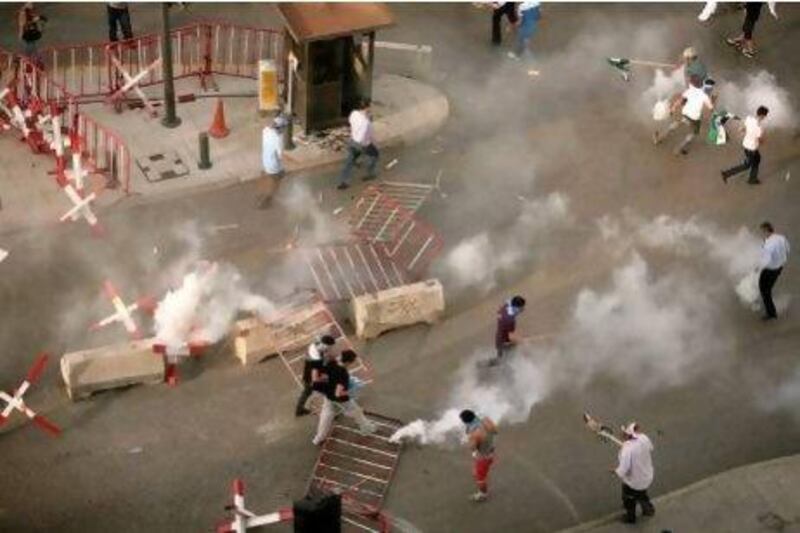BEIRUT // Grief in Lebanon for the three victims of a car bombing blamed on Syria turned to anger yesterday at the funeral of the attack's most high-profile target.
Police fired in the air and used tear gas to hold back hundreds of protesters trying to storm the prime minister Najib Mikati's office amid calls for him to quit.
Crowds attempted to break down security barricades blocking passage to the Serail, the seat of government.
The protesters blame the Syrian regime of Bashar Al Assad for the murder of Lebanon's intelligence chief Brig Gen Wissam Al Hassan, 47, in Friday's bombing.
And they say Mr Mikati's government is too close to the Syrian regime because it is controlled by Hizbollah, the Shiite militant group that is Mr Assad's closest ally in Lebanon.
"We came today because we want to stand up to Hizbollah's weapons that aim to scare us," said John, 19. "They have created this reality. There is no economy in this country, no jobs, no electricity and now no security."
Protesters carried banners that read "Bashar get out of the Serail". Others chanted: "Freedom forever in spite of you Assad!"
The Lebanese president Michel Suleiman eulogised Al Hassan in a military farewell at the headquarters of the Internal Security Forces. The intelligence chief's body was then taken to Martyrs Square along with that of his chauffeur.
They and a civilian woman were killed and 126 injured when the bomb exploded in the mostly Christian district of Achrafiyeh.
Lebanon's NBN network broadcast amateur footage from the bombing that showed that it was in fact two successive blasts seconds apart and not one as had been thought. The footage showed the fire and wreckage from the first blast with passers-by filming on their phones when a powerful second blast hits, sending out a plume of black smoke.
Al Hassan was buried in the mausoleum of his mentor, the former prime minister Rafiq Hariri, who was also assassinated in a car bombing in 2005. Syria, a political power broker with a decades-long military presence in Lebanon, has been blamed for that killing too.
In August, Al Hassan had helped to foil a Syrian-backed bomb plot aimed at stoking turmoil in Lebanon.
Mr Suleiman urged the work of Lebanon's security forces to continue and called for the support of all political parties.
"I am with you. I am with sovereignty and dignity. I am with the security of the citizen," Mr Suleiman said.
A former army chief, Mr Suleiman came to office in a consensus to end a political crisis in 2008. He was seen as a neutral figure in terms of Syria. His statement yesterday led one observer on Twitter to note: "Suleiman announced his defection from the Assad government today."
Yesterday's protest turned violent after a leading member of the anti-Syria March 14 coalition, the former prime minister Fouad Siniora, demanded that Mr Mikati step down.
"Leave, Mr Prime Minister, otherwise you'll be accused of covering up for the criminals," Mr Siniora told the cheering crowds. "The Lebanese will no longer accept the continuation of the Cabinet of assassination."
Nadim Koteish, a popular TV host, then took to the podium and said: "To the Serail."
Mr Siniora's office later urged protesters to pull back and keep the protest peaceful. It also denied it had any prior knowledge of the call to storm the prime minister's office.
Last night, crowds in predominantly Sunni areas of Beirut once again blocked roads with burning tyres. There were minor clashes reported in Tripoli between Sunni and Alawite areas.
Despite calls for him to step down, Mr Mikati said on Saturday after an emergency cabinet meeting that he had agreed to stay in his post at the request of Mr Suleiman to avoid a "political vacuum" in volatile Lebanon.
The ISF chief Ashraf Rifi yesterday appointed Col Imad Othman to succeed Al Hassan as the head of its Information Branch.
The intelligence officer previously served as a chief of staff for the former March 14 coalition interior minister Hassan Al Sabaa.
The bombing has exacerbated tensions simmering in Lebanon since the uprising against Mr Al Assad, which activists say has killed more than 30,000 people, began in Syria in March last year. Lebanon is divided into pro and anti-Assad groups that have fought intermittently in Tripoli and Beirut.
While military vehicles and uniformed security forces moved through the streets of Beirut, the rally yesterday was reported to be smaller than in the past.
"After these successive events, there is a type of sadness, disgust and a disconnect. There is a big silent majority," said Wael Mansour, 30, who did not go to the protest. "This crime opens old wounds, but our politicians do not have credibility. There is a big vacuum that needs to be filled."
"We had a revolution but we kept the very same people. It is not them who lead us to change."
[ foreign.desk@thenational.ae ]
* Additional reporting by Agence France-Presse and Associated Press





